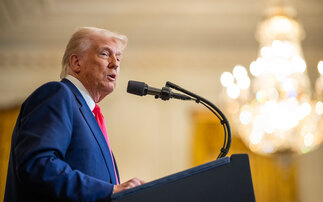Electoral success may have proved elusive, but the out-going Green Leader can look back on a broadly successful four years at the helm
How do you gauge the success of a small political party battling an electoral system that is stacked against it? Or, to bring the question up to date, how will Natalie Bennett and the Green Party feel as she prepares to step down following four years at the top of the Party?
For Bennett and her colleagues it is arguably unfair to determine success or failure against the narrow electoral terms of seats won, governments formed, and policies enacted. Growing your vote share and commanding the support of 3.8 per cent of the electorate at a general election, as Bennett's Greens did last May, should be seen as a success for a minor party. But then again, it is still seats that matter and at a time when trust in mainstream politics is at all time low a challenger party with genuinely bold ambitions would have hoped to have done more than hold on to its single seat.
If the tilted playing field that is the British electoral system makes it unreasonable to measure Bennett's performance solely at the ballot box - and it is worth noting that she oversaw a series of solid showings at the European, local, and London Assembly elections - how else should success be gauged?
They may be like chalk and cheese, as different as a wind farm and an oil slick, but should the measure of success for Bennett have been UKIP's controversial leader Nigel Farage? After all, despite negligible electoral success (the Greens beat UKIP in the race for their first parliamentary seat) Farage has frequently succeeded in shaping the political conversation, commanding headlines, and forcing the government to shift its position. He is also close to his over-arching strategic goal. We would not be having an EU referendum were it not for the success the Farageistas had in putting the frighteners on David Cameron during the last parliament.
Against this measure, Bennett has enjoyed more success. She ensured the Greens had their most high profile election campaign to date, secured a place in the TV debates, helped keep a host of environmental issues in the spotlight, no doubt played some role in shifting Labour's election campaign to the left, and, most important of all, massively increased the Party's membership from 13,000 to 63,000.
It is this last achievement that is arguably Bennett's biggest legacy from her time as leader. She is, by her own admission, not the most natural media performer. But she has won praise from many within the Green Party for her organisational effectiveness, managing the influx in membership and ensuring that the momentum that built up last year was harnessed into something tangible. A Party that for too long was hamstrung by in-fighting, somewhat bizarre internal processes, and a limited membership base that made it difficult to put forward candidates in many seats has appeared more disciplined, more effective in its elected positions, and more national in its reach.
However, it is also true the Green Party has struggled to emulate Farage's ability to punch above his electoral weight (an underperformance that cannot be solely blamed on a hostile media). Bennett was never, in her own words, "a smooth, spin-trained, lifelong politician - it's both my strength and my weakness that I answer the question". But there is a reason why it is conventional, media-savvy politicians who tend to prosper (and make no mistake, for all his populist posturing Farage is a conventional, media-savvy politician). Bennett's media engagement and communication skills were always her Achilles' heel and it was left even more exposed by the party's adoption of a genuinely radical, overtly left wing agenda that at times underplayed its more mainstream environmental concerns. If he ever wants to make it to Number 10, Jeremy Corbyn should perhaps take note.
The Greens radical prospectus contained some fascinating ideas, many of which were not as extreme as they first appear. For example, the concept of a citizens' income has more support from respected economists than you would think given the shellacking it got in the media, while the Party's calls for a economic metric that reaches beyond GDP was previously toyed with by David Cameron. However, a failure to build closer ties with green businesses and those more centre ground groups that could have emphasised the way many of the Greens' environmental concerns are firmly entrenched in the mainstream limited the Party's appeal at a time when public scepticism towards the leading parties should have opened a window of opportunity.
These are ongoing challenges Bennett's successor will now have to wrestle with. Some within the Party will argue that with five years parliamentary experience and a reputation for impressive media performances it is time for Caroline Lucas to return to the role that first gave her a national profile. Others will counter Lucas' original desire to step down in order to broaden the number of Green Party figures with such a platform has proven effective and should be repeated.
Whoever takes up the reins will find a growing organisation that is not only in good health, but also has an important role to play in the UK's transition to a low carbon economy. Bennett's part in that transition means she will be remembered for a lot more than being the politician who brought the term 'brain fade' into the political lexicon. It is often forgotten that Bennett's notorious car-crash radio interview during last year's election campaign was followed by that rarest of political phenomena, a genuine and heart felt mea culpa which deserved to unite all observers in admiration of this genuine and heartfelt politician.









